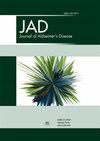筛选抗癫痫药物以打破神经元过度兴奋性和阿尔茨海默病之间的循环。
IF 3.1
3区 医学
Q2 NEUROSCIENCES
Journal of Alzheimer's Disease
Pub Date : 2025-10-01
Epub Date: 2025-08-03
DOI:10.1177/13872877251364556
引用次数: 0
摘要
癫痫通常与阿尔茨海默病合并症,现在已经确定癫痫会加速疾病进程。在本研究中,Knox及其同事在两种不同病因的老年阿尔茨海默病小鼠模型中评估了几种抗癫痫药物(asm)减轻癫痫诱导的疗效。他们发现不同性别和不同模型对癫痫诱导和ASM治疗的反应不同。这些结果揭示了性别、阿尔茨海默病风险基因和神经元高兴奋性之间复杂的相互作用,表明一种量身定制的癫痫控制方法可能最大限度地提高阿尔茨海默病的治疗效果。本文章由计算机程序翻译,如有差异,请以英文原文为准。
Screening antiseizure medications to break the cycle between neuronal hyperexcitability and Alzheimer's disease.
Epilepsy is commonly comorbid with Alzheimer's disease and is now well established to accelerate disease course. In the present study, Knox and colleagues evaluated the efficacy of several antiseizure medications (ASMs) in mitigating seizure induction in two aged Alzheimer's disease mouse models with distinct etiologies. They found differential responses to seizure induction and ASM treatment across sexes and models. These results reveal a complex interplay between sex, Alzheimer's disease risk genes, and neuronal hyperexcitability that suggest a tailored approach to seizure control may maximize therapeutic benefit in Alzheimer's disease.
求助全文
通过发布文献求助,成功后即可免费获取论文全文。
去求助
来源期刊

Journal of Alzheimer's Disease
医学-神经科学
CiteScore
6.40
自引率
7.50%
发文量
1327
审稿时长
2 months
期刊介绍:
The Journal of Alzheimer''s Disease (JAD) is an international multidisciplinary journal to facilitate progress in understanding the etiology, pathogenesis, epidemiology, genetics, behavior, treatment and psychology of Alzheimer''s disease. The journal publishes research reports, reviews, short communications, hypotheses, ethics reviews, book reviews, and letters-to-the-editor. The journal is dedicated to providing an open forum for original research that will expedite our fundamental understanding of Alzheimer''s disease.
 求助内容:
求助内容: 应助结果提醒方式:
应助结果提醒方式:


